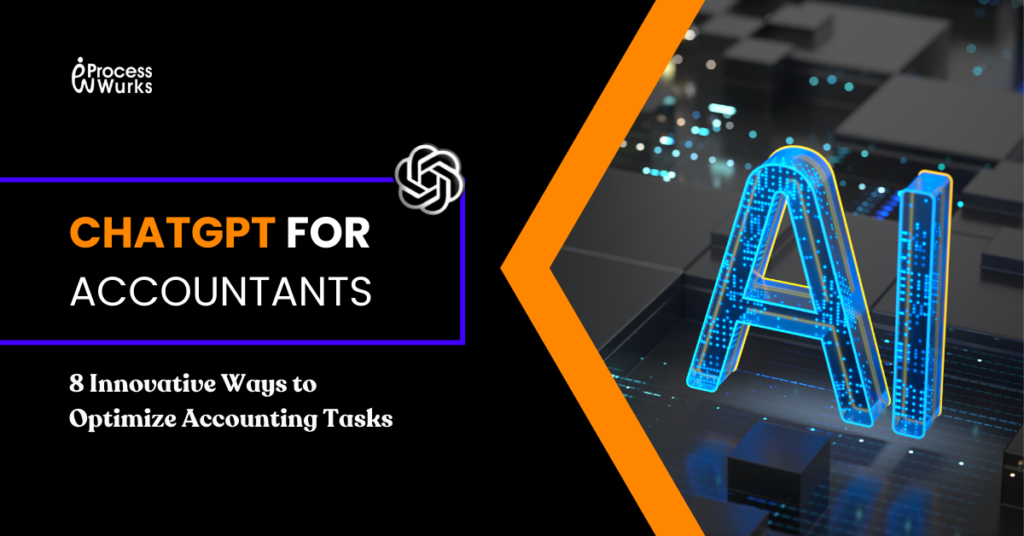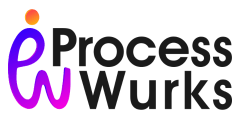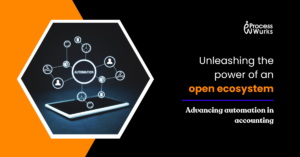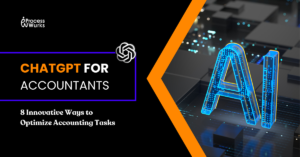ChatGPT for Accountants: 8 Innovative Ways to Optimize Accounting Tasks

Share This Post
Artificial intelligence is transforming accounting. New AI tools are changing how accountants work. To stay competitive, you must use AI.
One of the leaders in this revolution is ChatGPT, an AI model from OpenAI. It’s the fastest-growing application ever, with over 100 million users in just a few months.
In this article, we’ll show you how ChatGPT can improve accounting. You’ll learn how it boosts efficiency and helps you succeed in today’s accounting world.
Read More – How Accountants can improve their Sales Pipeline with ProcessWurks
What is ChatGPT?
ChatGPT is a powerful AI tool that understands and generates text-based language based on your input. It blends natural language processing and machine learning to have human-like conversations.
Unlike traditional chatbots, ChatGPT isn’t limited to fixed responses. It learns from a wealth of text data, adapts to various subjects, and gets better over time.
This means ChatGPT can:
- Understand your questions, prompts, and statements
- Switch writing styles to match your requests
- Provide quick and relevant responses
- Keep the context of the conversation in mind
ChatGPT’s data-driven learning makes it incredibly versatile. While it’s still in its early stages, users are already finding innovative ways to use it. For ex. Research, idea generation, language translation, content creation, and even coding assistance.
Using ChatGPT in Accounting: 12 Innovative Ways to Boost Efficiency
ChatGPT is a game-changer for accountants. It swiftly provides precise answers, making it a vital tool for saving time and enhancing workflows. And the best part? It’s just the beginning.
Currently, only 5% of tax professionals have embraced ChatGPT and similar AI software. But change is on the horizon, with 6% of tax pros gearing up to adopt ChatGPT soon, and an additional 26% actively considering it.
In this section, let’s dive into exciting ways you can leverage ChatGPT in your accounting practice.
1. Automating Bookkeeping Tasks
Bookkeeping is a cornerstone of accounting, but it often involves tedious, manual tasks. ChatGPT can change that by:
- Converting data from e-receipts, invoices, and financial documents into neat spreadsheets or tables.
- Sorting and tagging expenses, income sources, and transactions.
- Ensuring data accuracy and completeness with thorough checks.
Let’s take a look at how ChatGPT can quickly identify and categorize items on your client’s bank statement.
2. Turbocharge Tax Return Prep
Tax returns are the lifeblood of accounting firms. However, during tax season, we face the challenge of serving numerous clients in limited time. ChatGPT is the game-changer we’ve been waiting for. Here’s how it supercharges tax preparation:
- Simplifying tax jargon and concepts
- Crafting standardized tax prep checklists
- Ensuring error-free entries and calculations
- Crafting responses to IRS notices
- Offering insights on tax deductions and credits
Please note that for real-time data, ChatGPT Plus is available, integrating with Microsoft’s Bing search engine. While this feature is expected to be in the free version soon, for now, it relies on data only up to September 2021, making it less reliable for the latest IRS deductions and rules.
3. Simplify Financial Reports
Accounting firms need accurate and timely financial reports. Streamline this task with ChatGPT. By giving it the right instructions, ChatGPT can create templates for various financial reports, like balance sheets, income statements, and cash flow statements. Here’s an example:
4. Craft Marketing Strategies
ChatGPT isn’t just for content; it can shape your entire marketing strategy. Large firms can use it to assist their marketing teams, while smaller ones can rely on it entirely.
Below is an example of a ChatGPT-generated marketing strategy. You can also automate or improve various steps in this process with ChatGPT:
5. Enhance Learning and Training
ChatGPT serves as a valuable learning resource, especially for accounting students and junior accountants. It acts like a virtual tutor, answering questions, creating study materials, and testing knowledge.
While ChatGPT may not have the latest tax or accounting standards, it’s a goldmine for general topics. Here’s an example of how ChatGPT can help you test your accounting skills:
Read More – Avoid Low-Value Work with Workflow Automation
6. Quick and Accurate Invoicing
Accountants rely on timely payments. Instead of using conventional software for invoices, ChatGPT offers a unique solution. With ChatGPT plugins, you can create invoices effortlessly. Just provide client and payment details, and let ChatGPT handle the rest.
7. Fraud Detection and Risk Assessment
Detecting fraud manually is complex. Finding irregularities in extensive financial data is like searching for a needle in a haystack. ChatGPT can make this process much easier.
While many accounting firms haven’t adopted ChatGPT for fraud detection yet, JPMorgan, a major investment bank, is developing its own generative AI for fraud detection. This demonstrates ChatGPT’s potential in this field.
8. Standardize Processes with Checklists
Accounting relies on standardized processes for accuracy and consistency. Checklists are a valuable tool for this purpose. They outline the essential steps to follow in various situations, ensuring uniformity in your firm’s accounting procedures.
ChatGPT can swiftly generate various process checklists. You may need to customize them, but using ChatGPT will save you a significant amount of time. Here’s an example:
Read More – Boost Productivity with ProcessWurks: A Guide for Accountants
The Future of ChatGPT in Accounting
In the fast-paced world of AI, progress never stops. Engineers continually improve the technology behind AI tools, making them more useful and precise. But what’s in store for ChatGPT in the field of accounting? Here’s what to expect:
- Deeper Financial Insight:
ChatGPT will become even smarter, grasping intricate accounting ideas to offer more tailored advice.
- Advanced Data Analysis:
ChatGPT’s ability to crunch financial data will get even better. It will provide precise trend analysis, explain variations, and offer predictive analytics.
- Seamless Software Integration:
Most accounting software will soon include ChatGPT integration. This means users can automate tasks through their accounting system with ease.
- User-Friendly Interfaces:
Imagine ChatGPT seamlessly incorporated into your accounting software. Instead of complex commands, you’ll interact with it using plain language.
- Real-Time Data Connection:
Future ChatGPT versions will connect with real-time financial sources like banks, stock markets, and currency exchanges. This ensures you get up-to-the-minute financial insights.
These advancements will transform ChatGPT from a curiosity into an indispensable tool for modern accountants, revolutionizing the industry.
Conclusion
ChatGPT leads the way among AI-powered tools for accountants. Its adaptability makes it perfect for automating various tasks. While the accounting field has just started exploring ChatGPT’s capabilities, the future holds the promise of transformation.
Want to automate your firm? Try ProcessWurk free trial today
ONE Software to run your entire business. From Marketing to Sales to Client on-boarding to Client deliverables to Firm Operations
More To Explore





